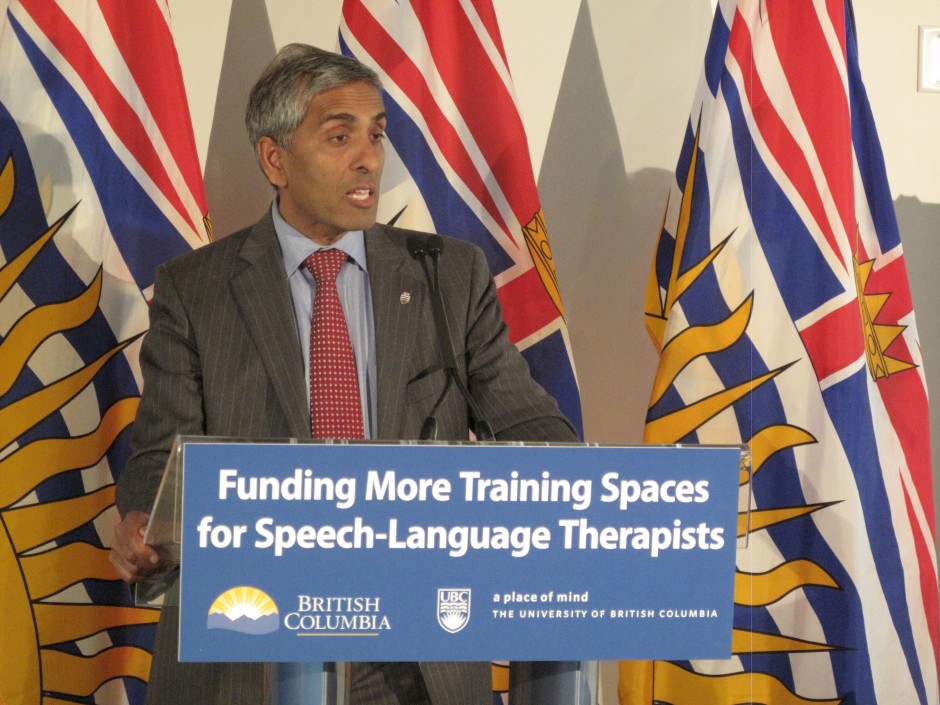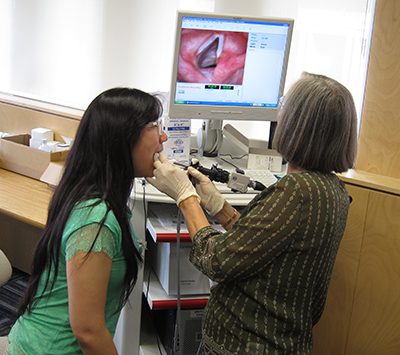
UBC President Arvind Gupta at the Sept. 16 announcement about expansion of the university’s speech-language pathology program. Photo credit: Kerry Blackadar
The University of British Columbia will be educating more speech-language therapists, thanks to a boost in provincial funding.
The number of first-year slots for a Master’s of Science in Speech- Language Pathology will grow from 23 to 36 – a 56 per cent increase – by 2016, an expansion intended to help the one in 10 people in British Columbia who have a speech or language disorder.
The expansion of the program is intended to help alleviate the shortage of speech-language therapists in northern and rural B.C. The average wait in B.C. for infants or children to be assessed by a health authority-based speech language therapist is four to eight months.
Speech-language pathologists diagnose and help treat a variety of disorders, including:
- Articulation problems (omitting, substituting or distorting speech sounds)
- Stuttering
- Voice problems (loudness, pitch, hoarseness)
- Language delays and disorders, including difficulty expressing and comprehending in oral and non- verbal contexts
- Swallowing and feeding disorders, sometimes resulting from neurological impairments or traumatic brain injury.
UBC’s speech-language pathology program, part of the Faculty of Medicine’s School of Audiology and Speech Sciences, is the only one in the province and one of only two in western Canada. Each year, the program receives about 150 applications for the 23 currently available seats.
Students complete the program in 21 to 36 months, depending on their undergraduate preparation and the students’ choice of graduating requirements. The curriculum includes graduate courses, five clinical externships in community settings and a final thesis, project or comprehensive exam. Graduates primarily work for B.C.’s school systems and health authorities, although many also work in non-governmental organizations and in private practice.

Research Associate Linda Rammage demonstrates on student Clara Liu how speech-language pathologists use laryngoscopy to examine a person’s vocal cords. Photo by Brian Kladko
The government of B.C. is providing $2.5 million in one-time funding for the expansion, and another $932,000 in annual operating funds.
“Most of us take the ability to communicate for granted, but for the thousands of British Columbians who have problems with speech, language or swallowing, speech therapists provide a bridge to the rest of the world,” said Amrik Virk, Minister of Advanced Education. “Adding 13 spaces to the training program at UBC will help meet the growing demand for qualified speech-language pathologists.”
The September announcement was made by Minister Virk and Stephanie Cadieux, the Minister of Children and Family Development. Joining them were Arvind Gupta, the President and Vice Chancellor of UBC; Kate Chase, the Member Services Councilor for the B.C. Association of Speech-Language Pathologists and Audiologists and a UBC Clinical Assistant Professor; and Christy Campbell, who has relied on speech-language therapists to help her recover from a stroke.
“This funding will provide B.C. with more professionals who can diagnose communications disorders, provide treatment, and collaborate with educators, health care providers, social workers, families and caregivers,” said Gavin Stuart, Dean of the Faculty of Medicine and UBC’s Vice Provost Health. “The Faculty of Medicine is eager to respond to thisvery pressing public need.”